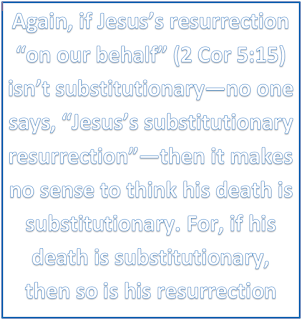Rillera’s Myth Busting Busting: Substitutionary Resurrection? (6 of 7)
 |
| (Your mum's resurrection body) |
Finally, it’s important to see how it is the resurrection of Jesus that bears a lot of the soteriological significance—at least for Paul. But it only makes sense as a tandem with the crucifixion. The logic in Paul is never “Jesus died so that neither I nor you have to” but rather, “Jesus died and that allows for us to share in that same death so that his life might also be made known in our bodies and to others” (cf. 2 Cor 4:7–12; 5:14–15). In this participatory flow of thought, it would be rather jarring and incomprehensible for Paul to all of sudden turn as say: “Actually, never mind the whole thing about sharing in Jesus’s death; he died as your substitute.”
For those who insist that the phrase hyper hēmōn (“for us”) is inherently substitutionary in places like 2 Cor 5:21 they need only to read a few sentences earlier where Paul has already ruled out that connotation of the phrase in 5:15: “And he died hyper all, so that those living might no longer be living for themselves, but to the one who died and was raised hyper them.” If hyper is inherently about substitution, then this means that Jesus’s resurrection is substitutionary as well which of necessity means no one will ever be raised since Jesus was our substitutionary resurrection. He is resurrected so that no one else has to be. This, of course, is unthinkable.
Here for Paul hyper means “for the sake of” or “for the benefit of” and does not carry substitutionary overtones, but rather is grounded in his stubborn participatory logic. (Fn. If hyper is inherently substitutionary, then several passages that use the word become unintelligible: e.g., Acts 9:16; 15:26; 21:13; Col 1:24; Col 2:1: Mark 9:40; John 6:51; 13:37; 17:19; Heb 6:19-20 compared with 10:19, 22). Both Jesus’s death and resurrection are hyper pantōn/autōn (5:15). If there was a word to conceptualize this, it would not be substitution. The phrase “inclusive participatory representation” might be good or the word “recapitulation” that Irenaeus was so fond of (see its use in Eph 1:10). For Paul, both Jesus’s death and resurrection benefit “all/them/us” precisely because it means that human beings participate in his very death and resurrection.
Similarly then, when Christ was “made sin” or “became a curse” hyper hēmōn (2 Cor 5:21; Gal 3:13), Paul is not inserting a diametrically opposed logic—a logic of substitution—into his participatory mode of thinking and explicating the meaning of the incarnation, death, and resurrection of Jesus. Gathercole’s rather astute definition of substitution rightly recognizes how incompatible each line of reasoning is (see part 5 for a discussion of Gathercole's definition). Rather, Paul is only talking about how Christ’s full participation in the sinful and cursed conditions of humanity is actually a benefit for humanity. Similar to how both Jesus’s death and resurrection are hyper pantōn/autōn (2 Cor 5:15) because human beings are supposed to participate in them, Jesus’s coming under sin and curse hyper hēmōn is the first logical step in Paul’s thinking: Human beings can participate in Christ because he first participated in us by coming under sin and curse as we were; Christ did all of these things for our benefit. In all cases, then, hyper is Paul’s means of communicating both benefit for humanity and the solidarity and participation between both Christ and humanity.
Therefore, when Christ was “made sin” or “became a curse” hyper hēmōn (2 Cor 5:21; Gal 3:13), he was not doing something substitutionary because these statements are about the whole incarnation whereby Jesus was simply entering into what human beings already were; he is therefore not taking upon himself something that human beings never experienced, should have experienced, but now will not have to. These statements are about Jesus fully sharing in the already present conditions of humanity. It was his perfect obedience in these conditions and resurrection from out of these conditions that allows this incarnation to be for the benefit (hyper) of all “in him” (2 Cor 5:21; Gal 3:13) since they are freed from sin and curse insofar as they are united with him in his death and resurrection.
Again, if Jesus’s resurrection “on our behalf” (2 Cor 5:15) isn’t substitutionary—no one says, “Jesus’s substitutionary resurrection”—then it makes no sense to think his death is substitutionary. For, if his death is substitutionary, then so is his resurrection.
The fact that the resurrection is the basis for “dealing with sins” is made clear in 1 Cor 15:17: “If Christ has not been raised…you are still in your sins.” If it was Jesus’s death alone that dealt with sins in some substitutionary way, then the consequence of Jesus not resurrecting would not be that humans are still in their sins (1 Cor 15:17). It would be: Well, your sins are dealt with (forgiven, cleansed, whatever), but we still do not know what is going to happen for sure after your body perishes (but most of us Jews believe in a general resurrection of the dead so let us hope for that—let’s just be glad we do not have to worry about being judged for our sins when we die).
Paul is consistent with this emphasis upon Jesus’s resurrection as dealing with sins in Romans 4. First, Paul equates justification with forgiveness in Rom 4:6–7 in his only use of aphiēmi (“forgiveness”) in his (undisputed) letters denoting divine forgiveness of sins (and he is quoting its use in Ps 32:1). Second, in 4:25 he says that Jesus “was raised on account of our justification” immediately after saying “he was delivered over on account of our transgressions.” Thus, as with 1 Cor 15:3, 17, it is actually the resurrection that effects “dealing with sins.” If there is no resurrection, then according to Paul one is not justified/forgiven (Rom 4:6–7, 25b) and they are still in their sins (1 Cor 15:7). Therefore, in the same way that Jesus’s resurrection is for others, and no one ever attempts to conceptualize it as a substitution (cf. 2 Cor 5:15), I do not think Paul is conceptualizing Jesus’s death as a substitution in 1 Cor 15 (or Rom 4:25a) either. The two go together hand in hand. The death and resurrection of Jesus are for others only to the extent that others are joined with them according to Paul (1 Cor 15:22; Rom 6:3–8).
We need, then, to find an adequate substitute for the word “substitutionary.” Using “atonement” in a broader sense than sacrificial kippēr, what we have throughout the NT is a “participatory atonement” or “cursed solidarity atonement” theology.
Labels: Rillera






1 Comments:
I love the insights your are bringing here about 2 Corinthians 5 and the word hyper - spot on!
And I think your application of the guys definition of substitution is consistent with his definition, but I would say that his definition is a bit narrow, and may not capture the full semantic range of the word substitution, especially if you trace its etymological content. In other words, you are correct in that his definition, when consistently applied, does not "stand up" (that was a pun by the way based on the etymology of the word substitute :-) You may find some interesting connections with the etymology of the word substitute and the concept of resurrection...) under scrutiny. But I would say the concept of substitution is present by virtue of the fact that Jesus does in fact do things for us that we will never do ourselves, in the same way that he did them himself. For example, the concept of pioneering a way forward means that, in one sense, no one was able to make it as far as the pioneer on their own. But now that he as cleared the way, he has made it possible for us to go that far. So in that sense, he was alike a player on the bench in a basketball game sent into the game as a substitute for another player who, as of yet, has not been able to stop the opponent from scoring. It's not that the first player will never play again, but for that specific task, the first player was not capable of carrying out the job, and therefore the second player on the bench is sent into the game as a substitute to shut that other player down. Part of the problem with how PSA utilizes the concept of substitution is that it is static and penultimate. It's an end in and of itself (for reasons I am sure you're aware of.) Jesus does do things we cannot ever do, and will not ever do in the way he did them. For example, we will never develop a new humanity that could be shared with others. We will always derive our new human nature from our union with his human nature, which implies a substitution dynamic is at work. We passively receive his new humanity, while also actively participating in his new humanity. But none of us achieves a new humanity in the same way that Jesus achieved his new humanity. For example, Jesus does not receive a new humanity from anyone else, He develops it in himself first, without deriving it from another human nature. We, on the other hand, do not develop our own new human nature in total the same way Jesus developed his in total. We participate in his new humanity, and by virtue of that participation, are brought into a the same developmental process that he himself has already completed. But our new humanity will always be ultimately derivative from his new humanity, partly because we will never be able to catch up with the developmental progress he made during his lifelong, unbroken chain of obedience to God, thereby creating a new humanity according to the holiness and righteousness of God (Eph 4:24). In other words, in our developmental process, we will always be "a day late, and dollar short" to the developmental process itself.
Post a Comment
<< Home